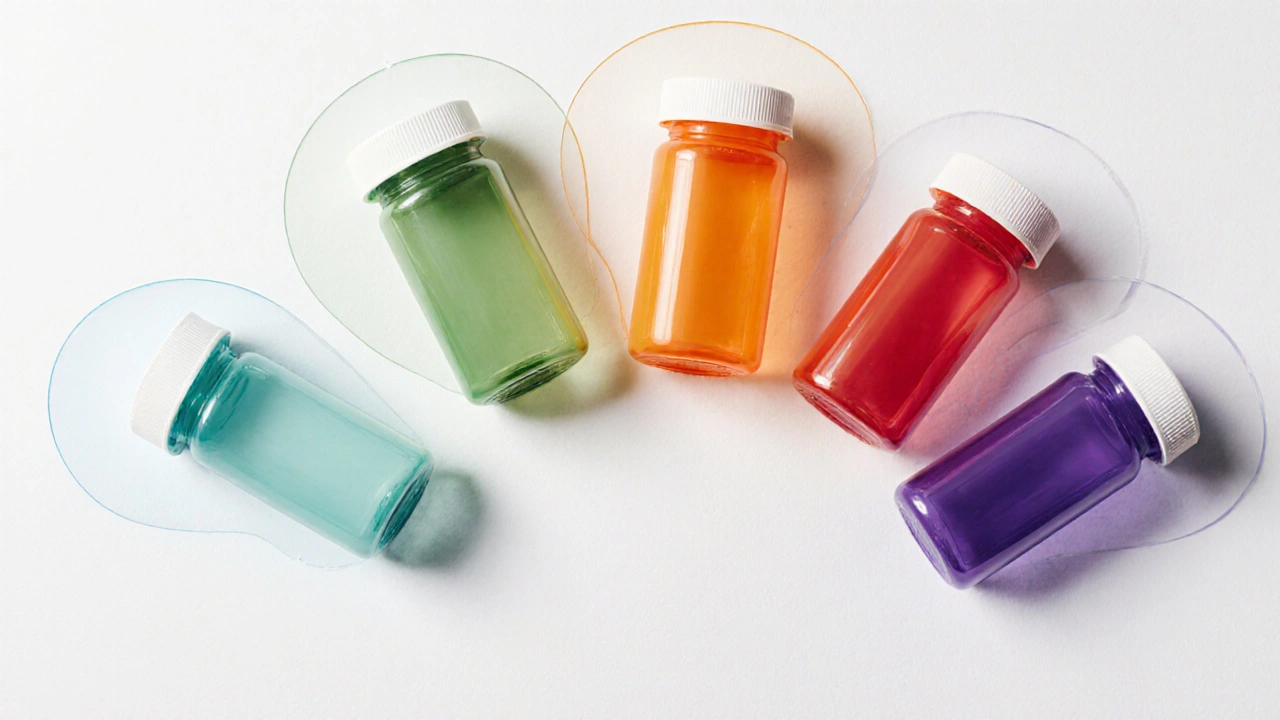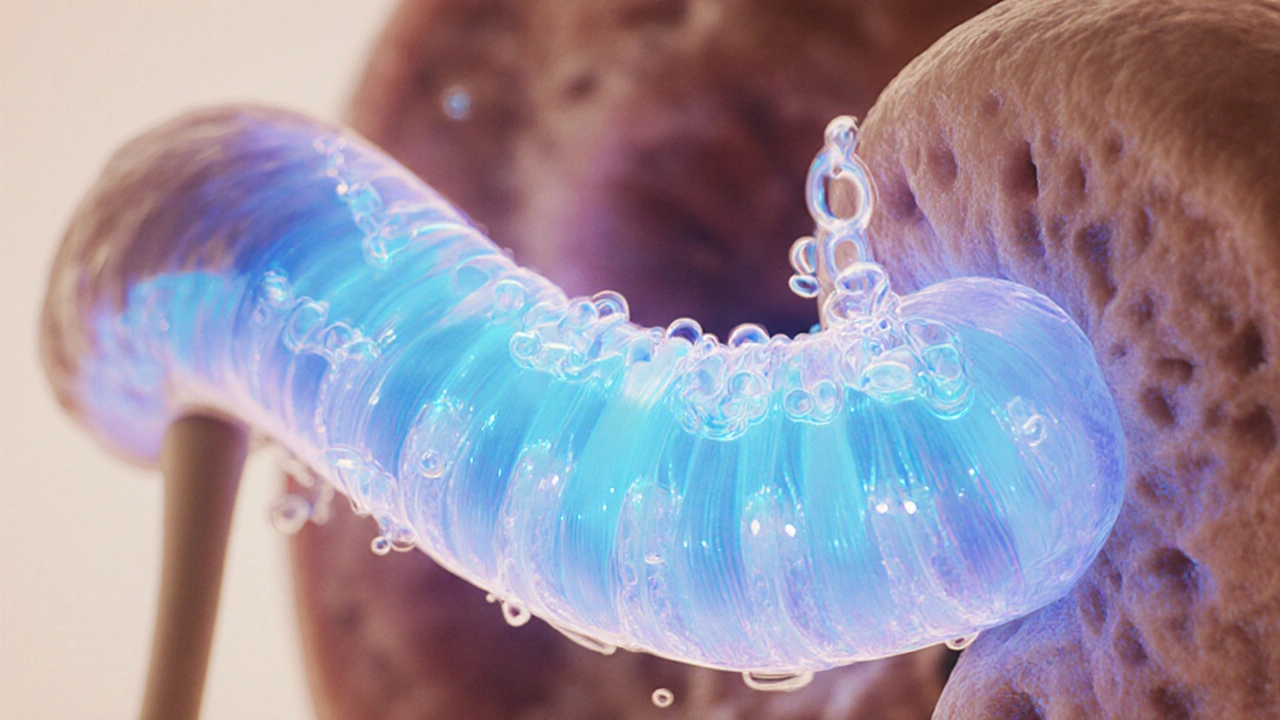Diuretic Selection Tool
This tool helps you understand which diuretic might be most suitable for your specific health situation based on key factors discussed in the article. Note: This is for informational purposes only and should not replace professional medical advice.
Your Health Factors
Your Personalized Recommendation
Key Takeaways
- Aquazide is a thiazide diuretic that lowers blood pressure by helping the kidneys get rid of excess sodium.
- Chlorthalidone and Indapamide are long‑acting thiazides that often achieve better blood‑pressure control with once‑daily dosing.
- Loop diuretics such as Furosemide work faster but are usually reserved for fluid overload, not routine hypertension.
- Spironolactone adds potassium‑sparing benefits and is useful when thiazides cause low potassium.
- Choosing the right agent depends on kidney function, electrolyte balance, cost, and how well your blood pressure responds.
What is Aquazide (Hydrochlorothiazide)?
When you see the name Aquazide is the brand name for hydrochlorothiazide, a thiazide‑type diuretic used primarily to treat hypertension and mild edema. The generic version, hydrochlorothiazide (often shortened to HCTZ), has been on the market since the 1960s and is listed on the WHO Essential Medicines list.
How does Aquazide work?
The drug targets the distal convoluted tubule of the kidney. By inhibiting the Na⁺/Cl⁻ symporter, it reduces sodium reabsorption, which pulls water into the urine. Less fluid in the bloodstream lowers cardiac output and, over time, decreases peripheral resistance - the two main drivers of high blood pressure.
Because the effect is modest (about a 5‑10mmHg drop in systolic pressure), doctors often combine Aquazide with other antihypertensives for stronger control.

Typical dosing and common side effects
Standard adult dosing starts at 12.5mg once daily, with the maximum usually capped at 50mg. The tablet is taken in the morning to avoid nocturnal bathroom trips.
Side effects are generally mild, but patients should watch for:
- Increased urination
- Low potassium (hypokalemia)
- Elevated blood sugar in diabetics
- Rare allergic rash or gout flare‑ups
Alternative diuretics worth considering
When Aquazide doesn’t give the desired pressure drop or causes troublesome side effects, clinicians look at other diuretics. The most common alternatives fall into three groups:
- chlorthalidone - a long‑acting thiazide‑like agent with a half‑life of 40‑60hours.
- indapamide - another thiazide‑like pill, often praised for less impact on potassium.
- furosemide - a loop diuretic that works faster and stronger, usually reserved for edema or heart‑failure patients.
In some cases, a potassium‑sparing diuretic such as spironolactone is added to balance electrolytes.
Side‑by‑side comparison
| Drug | Class | Typical Daily Dose | Half‑life | Sodium Excretion ↑ | Typical Cost (AU$) | Common Side Effects |
|---|---|---|---|---|---|---|
| Aquazide (hydrochlorothiazide) | Thiazide diuretic | 12.5‑50mg | 6‑15h | ≈15% | 0.10‑0.30 | Low K⁺, ↑ uric acid, mild ↑ glucose |
| Chlorthalidone | Thiazide‑like diuretic | 12.5‑25mg | 40‑60h | ≈25% | 0.20‑0.50 | Low K⁺, photo‑sensitivity, dry mouth |
| Indapamide | Thiazide‑like diuretic | 1.5‑2.5mg | 14‑20h | ≈20% | 0.30‑0.70 | Low K⁺, dizziness, rare rash |
| Furosemide | Loop diuretic | 20‑80mg | 2‑4h | ≈40‑60% | 0.15‑0.40 | Low K⁺, ototoxicity, dehydration |
| Spironolactone | Potassium‑sparing diuretic | 25‑100mg | 1.5‑2h | ≈5‑10% | 0.25‑0.60 | Hyperkalaemia, menstrual changes, GI upset |
Pros and cons of Aquazide versus each alternative
Aquazide vs. Chlorthalidone
Pros: cheap, well‑studied, available as a generic.
Cons: shorter half‑life means some patients need twice‑daily dosing; may be less potent for stubborn hypertension.
Aquazide vs. Indapamide
Pros: broader global availability, simple dosing.
Cons: Indapamide tends to cause fewer potassium drops and may be better for patients with borderline low K⁺.
Aquazide vs. Furosemide
Pros: ideal for chronic blood‑pressure management, less risk of severe electrolyte depletion.
Cons: Furosemide works faster for fluid overload, so Aquazide isn’t the right choice for acute pulmonary edema.
Aquazide vs. Spironolactone
Pros: Aquazide’s side‑effect profile is more predictable; spironolactone can raise potassium and cause hormonal side effects.
Cons: In patients who develop hypokalemia on Aquazide, adding spironolactone can neutralize the issue.

How to pick the right diuretic for you
Think of the decision as a checklist:
- Do you have chronic kidney disease? If eGFR < 30ml/min, avoid thiazides and consider a low‑dose loop.
- Is low potassium a concern? Indapamide or a potassium‑sparing add‑on may be safer.
- How often can you remember a dose? Long‑acting chloro‑thalidone works once daily for most people.
- What’s your budget? Aquazide remains the cheapest option in Australian pharmacies.
- Any other meds? ACE inhibitors, ARBs, or NSAIDs can interact with diuretics and shift electrolytes.
Discuss these points with your GP or pharmacist. They’ll weigh the numbers against your personal health history.
Potential drug interactions and safety tips
All diuretics can magnify the effects of other blood‑pressure agents, so monitor for excessive drops. Specific cautions:
- NSAIDs (e.g., ibuprofen) may blunt the sodium‑loss effect of thiazides.
- ACE inhibitors or ARBs increase the risk of high potassium when combined with spironolactone.
- Lithium levels can rise dramatically with any diuretic; blood checks are essential.
- Alcohol can worsen dehydration; stay hydrated but avoid excess.
Regular lab work (electrolytes, kidney function) every 3‑6months helps catch issues early.
Quick guide to Hydrochlorothiazide alternatives
If Aquazide isn’t cutting it, start with chlorthalidone for a longer‑acting thiazide effect. Switch to indapamide if potassium loss becomes a problem. Reserve furosemide for fluid overload or heart‑failure cases, and add spironolactone only under close supervision.
Frequently Asked Questions
Can I take Aquazide with my blood‑pressure pill?
Yes, Aquazide is often prescribed alongside ACE inhibitors, ARBs, or calcium‑channel blockers to achieve better control. Your doctor will adjust doses to avoid too‑low pressure.
Why does Aquazide cause low potassium?
Thiazide diuretics increase sodium loss, and potassium follows sodium out of the kidneys. Eating potassium‑rich foods or taking a supplement can offset this.
Is chlorthalidone better for hypertension?
Many studies show chlorthalidone reduces cardiovascular events slightly more than hydrochlorothiazide because of its longer half‑life and stronger sodium‑excretion effect. However, individual response varies.
Can I use furosemide for high blood pressure?
Furosemide is powerful but not ideal for routine hypertension. It’s usually reserved for edema, heart‑failure, or kidney disease where rapid fluid removal is needed.
What should I monitor while on a diuretic?
Check blood pressure weekly, and get blood tests for potassium, sodium, creatinine, and glucose every few months. Watch for dizziness, muscle cramps, or excessive urination.






Reviews
Alright folks, let me walk you through the whole diuretic landscape because there’s a lot to unpack and I don’t want anyone to miss a detail. First off, Aquazide, which is just a brand name for hydrochlorothiazide, belongs to the thiazide class and works by hitting the Na⁺/Cl⁻ symporter in the distal convoluted tubule – that’s the bit of the kidney where a lot of sodium gets re‑absorbed, so blocking it pushes more water out.
Now, the effect on blood pressure is modest, usually a 5‑10 mmHg drop, which is why doctors love to pair it with other agents like ACE inhibitors or calcium‑channel blockers for a stronger punch. The cheap price tag (think a few cents per pill) makes it a go‑to for a lot of patients, especially in places with tighter budgets.
But there are trade‑offs. The short half‑life (6‑15 hours) often means you might need to take it twice a day to keep your BP steady, and that can be a hassle for people who forget doses. Also, because it forces the kidneys to lose sodium, potassium often follows – leading to hypokalemia if you’re not careful with diet or supplements.
If potassium is already low, alternatives like indapamide or chlorthalidone tend to be gentler on that front. Indapamide, for example, has a half‑life that’s a bit longer and causes less potassium loss, making it a solid choice for borderline hypokalemic patients.
Chlorthalidone is another heavyweight in the thiazide‑like family; its half‑life stretches to 40‑60 hours, so once‑daily dosing usually does the trick. Some studies even suggest it reduces cardiovascular events a tad more than hydrochlorothiazide because of that prolonged effect.
When you have an eGFR below 30 mL/min, though, thiazides lose their punch. The kidney’s ability to filter is compromised, so the drug can’t get the job done efficiently. In those cases, clinicians flip the script and go for a loop diuretic like furosemide, which still works well even when kidney function is low.
Speaking of loops, furosemide is powerful and works quickly – great for fluid overload in heart failure or severe edema – but it yanks a lot of electrolytes and can cause ototoxicity if you’re not cautious, so it’s not a first‑line for chronic hypertension.
Don’t forget potassium‑sparing options like spironolactone. It does the opposite of thiazides by retaining potassium, which can balance out the loss from a thiazide, but it brings its own set of side‑effects like hormonal changes in men and women.
Drug interactions are a whole other beast. NSAIDs can blunt the diuretic effect, while ACE inhibitors or ARBs can push potassium up, especially if you’re also on a potassium‑sparing agent. Lithium levels can skyrocket with any diuretic, so regular blood work is a must.
Cost‑sensitivity also matters. Aquazide is the cheapest, but if you’re on a tight budget and need a reliable once‑daily regimen, chlorthalidone is still pretty affordable and may save you a trip to the pharmacy.
Bottom line: pick the drug that matches your kidney function, potassium status, dosing convenience, and wallet. Always keep an eye on labs every few months and talk to your doctor before making any switches.
Look, they want you to think every cheap pill is safe. Big pharma pushes hydrochlorothiazide because it’s cheap and they make a profit off the side effects you’re left dealing with.
Wow, such a thorough breakdown! 😅 If I had a dollar for every time I heard "Aquazide is cheap and effective", I could actually afford the fancy brand‑name versions. 🙃 But seriously, great job covering all the bases.
Reading this feels like watching a medical drama where every lab result is a plot twist! 🎭 The potassium drama alone could win an Oscar. Thanks for the insights! :)
Building on the earlier point about renal function, it's crucial to note that thiazide efficacy declines markedly when eGFR<30 mL/min due to reduced tubular secretion capacity. Consequently, the pharmacokinetic profile shifts, necessitating a transition to loop diuretic therapy to maintain natriuretic efficiency while mitigating risk of volume overload.
Great info! Just a reminder to double‑check your electrolytes after any diuretic change.
If you’re deciding between Aquazide and chlorthalidone, consider that the latter’s longer half‑life often translates to better adherence, especially for patients who struggle with twice‑daily dosing. Also, keep an eye on photosensitivity with chlorthalidone – a simple sunscreen habit can go a long way.
Ah, the age‑old paradox: we chase stability in a world that refuses to be stable. Choosing a diuretic becomes a metaphor for our search for control – we pick the one that promises consistency, yet the body reminds us of its own chaotic elegance.
It's fascinating how each diuretic mirrors a different philosophy of care: Aquazide offers simplicity, chlorthalidone offers durability, indapamide offers balance, and furosemide offers power. Understanding where you fit in that spectrum can guide a more personalized conversation with your clinician.
In clinical practice, the selection of a diuretic should be anchored in a comprehensive assessment of renal function, serum electrolytes, comorbid conditions, and patient adherence capacity. It is advisable to schedule follow‑up laboratory evaluations at 4‑6 week intervals after initiating or adjusting therapy to ensure therapeutic efficacy while mitigating adverse events.
Honestly, this article could have cut the fluff and just given a table.